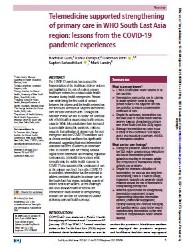Telemedicine supported strengthening of primary care in WHO South East Asia region: lessons from the COVID-19 pandemic experiences

The COVID-19 pandemic has exposed the fragmentation of the healthcare delivery systems and highlighted the role of resilient primary healthcare systems for a robust public health response during health emergencies.
Primary care while being the first point of contact between the citizens and the health systems has received scant attention or targeted investments over the past several decades.
As the pandemic progressed, several countries in the region introduced or expanded access to telemedicine services to maintain essential medical care as face-to-face visits were deemed unsafe thus making telemedicine critical for care delivery. George Institute India team led a narrative review to outline the potential role of telehealth in augmenting health systems capacity in the WHO South East Asia region.
Role of telemedicine in re-aligning the primary healthcare
Our review highlights that governments, policy makers and implementation agencies have been facing a number of challenges prior to the pandemic, a predominant one being lack of policy support to foster implementation of digital health interventions. Lack of robust primary care systems and non-existing referral pathways result in overburdening of health systems capacity at secondary and tertiary care centres.
While comprehensive evaluation of telemedicine in the SEA region has not been systematically undertaken, the recent experience from use of telemedicine during the pandemic and emerging evidence suggest that telemedicine could hold promise in supporting strong and resilient primary care systems.
The COVID-19 pandemic has highlighted the opportunities that these technologies offer to bridge existing gaps in health services delivery. However, the hope that telemedicine will solve the persistent structural problems, specifically in primary care are likely to be short-lived beyond the pandemic.
We call for strategic investments into primary healthcare and supportive policy environment to leverage telehealth as a tool to support health systems in WHO South East Asia Region towards achieving universal health coverage.
Download the research paper
Read Full Paper published in BMJ Innovations here
Stay connected and updated
Subscribe to our mailing list for the latest news, events, and updates in health research.

